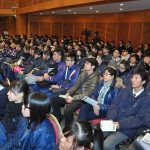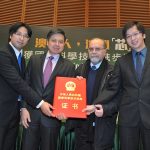
Today (28 February 2012), the University of Macau (UM) and the Science and Technology Development Fund (FDCT) of Macao SAR co-organized a "Macao Chip by Macao People" - Sharing Session on the First State Scientific and Technological Progress Award for Macao, at Macao Science Center. Prof. Ben U Seng Pan, Prof. Elvis Mak Pui In and Dr. Terry Sin Sai Weng of UM, who received the award for their project, "Design and Development of High Performance Analog & Mixed-Signal Circuit Techniques", shared their experience in scientific research and technology transfer with approximately three hundred teachers and students from local secondary schools. In his speech, President of FDCT's Administrative Committee Dr. Tong Chi Kin noted that the fact that the three UM professors, who are all Macao natives, won the State Scientific and Technological Progress Award, proves that Macao people are absolutely and intellectually capable of achieving outstanding results in scientific research, and that there are plenty of platforms in Macao for one to display his talents. He hopes that teachers can constantly encourage the students and stimulate their interest in science so as to provide a steady supply of talented people to support the sustainable development of science and technology in Macao. UM Rector Wei Zhao also delivered a speech in which he thanked the Macao SAR government for its longstanding support for education and scientific research through FDCT. Wei Zhao thinks that research is important not only because it can boost economy and improve people's well-being, but also because it is an important means to produce creative people with international competitiveness. UM's Vice Rector (Research) Prof. Rui Martins explained the awarded project to the audience, and then the three award recipients shared with the students about how, under the leadership of Prof. Rui Martins, UM began developing chips when research resources in Macao were almost non-existent; about how, through over ten years of development, UM overcame numerous technical and resource-wise difficulties and developed over ten internationally-advanced new technologies in the field of analog and mixed-signal VLSI and formed a world-class microelectronics research team. They also told the students about how, with the support of FDCT, the State Key Laboratory of Analog and Mixed-Signal VLSI came into being. The research team's relevant research outcomes have been presented at the International solid-State Circuits Conference of the Institute of Electrical and Electronics Engineers, which is considered "the Chip Olympics", and have led to over one hundred and fifty papers, several U.S. patents, and over ten other awards and prizes. Members of the microelectronics research team have received the Prize for Scientific and Technological Innovation 2010 of the Ho Leung Ho Lee Foundation and the Order of Merit from the Macao SAR government. During the Q&A session, many students seized the opportunity to ask questions, which were patiently answered by the three professors. The three also encouraged the students to set goals early, study hard, and preserve in the pursuit of their dreams, in order to attain greater achievements. The awarded project can be applied to name-brand consumer products and electronic products. It is expected to generate considerable economic benefits and play a positive role in advancing state-of-the-art research, industrial diversification, and internationalization of Macao. It's fair to say that UM is internationally ahead of the industry and the academic world in terms of microelectronics research development.
View gallery


